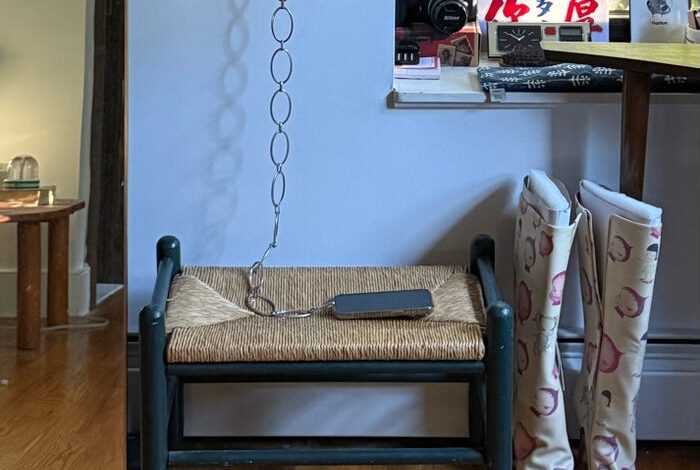Gen Z Writer Chains Phone to Wall for Week, Discovers Life Beyond Screens

UPDATE: In a bold experiment to reclaim her life from digital distractions, Tiffany Ng, a 24-year-old writer from New York, chained her iPhone to a wall for an entire week. The eye-opening challenge revealed the depth of her reliance on technology and sparked a conversation about mindfulness in an increasingly digital world.
Ng, who runs the newsletter Cyber Celibate, initiated this radical project to explore her dependence on her smartphone. “I found myself, like most, attached to my phone,” she explained. By physically restraining her device, she sought to break the cycle of mindless scrolling that consumes so many lives today.
The experiment, which took place earlier this month, involved using an old belt to secure her phone to the wall, making it nearly impossible to access. Ng set the phone to charge at the start of the week and did not recharge it until the experiment concluded. “I thought if I chained my phone to my wall, it would make using it uncomfortable,” she stated.
Initially, the first days were challenging. Ng faced difficulties asking for the time and directions without her phone. However, as the week progressed, she experienced a profound sense of liberation. “It felt like I was reentering real life in a way,” she noted, highlighting the transformation in her daily interactions and perceptions.
Without the constant presence of her phone, Ng began noticing her surroundings more keenly. She described how she observed the architecture of buildings near her train station and the distinct behaviors of commuters. “I started to notice how the air smells different at various stations,” she recalled, emphasizing the importance of being present in a world filled with distractions.
The experiment transformed her relationship with technology. “Scrolling isn’t satisfying,” Ng shared, revealing that the anticipation of using her phone often led to disappointment. With her device locked away, she felt free from the temptation to check notifications or scroll through social media.
As a result of this self-imposed digital detox, Ng has made a conscious effort to leave her phone at home during outings. “Now I think, ‘Keys and wallet,’ instead of ‘Phone, keys, wallet,'” she explained, showcasing a shift in her priorities.
Her experience resonates with many in Gen Z, who navigate a landscape of constant connectivity. “My generation is different from prior eras of technology,” Ng remarked, suggesting that younger individuals may have a unique perspective on balancing technology with real-life interactions.
Moving forward, she plans to refine her approach to technology, incorporating the lessons learned from this week-long challenge. “It’s not about giving up my iPhone,” she concluded, “but finding different ways to use technology that work for me.”
This urgent exploration into the effects of smartphone dependency prompts a larger conversation about digital mindfulness and the potential for a healthier relationship with technology. Ng’s story is a powerful reminder of the value of stepping back, even for just a moment, to reconnect with the world around us.
As she continues to share her journey through Cyber Celibate, many are left wondering: how can we all reclaim moments of our lives from the grasp of our devices? The conversation is more relevant now than ever.






